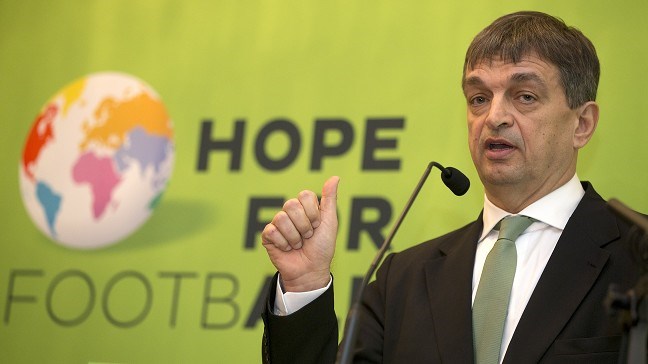By Andrew Warshaw
April 23 – FIFA presidential candidate Jerome Champagne has denounced what he describes as the polarisation of European football in the latest edition of his thematic manifesto policy distributed to all FIFA’s 209 member federations.
Champagne, who used to be deputy secretary general of FIFA but was ousted in 2010 after 11 years at the organisation, launched his surprise candidacy in January and has been travelling round the world gauging how much support he might get at next year’s presidential election.
It is an open secret that there is no love lost between Champagne and UEFA boss Michel Platini, his French compatriot who has not yet decided whether to stand.
In a veiled attack on UEFA, Champagne outlines a detailed statistical analysis of the state of European football, laying out his case for reform by pinpointing what he believes is a serious imbalance between the haves and have-nots – especially in the Champions League.
“Still homogenous 20 years ago, European football became polarised to the extreme due to the impact of three elements,” writes Champagne. One is the Bosman case but the other two, he suggests, are the direct fault of UEFA: “The format of the Champions’ League aimed to reduce the sport risk and the increased number of positions for some countries” and “the money distribution mechanism, notably the market pool system, which reinforces the imbalance of an already-unbalanced playing field.”
“The consequence is that countries which were previously competitive at club level now see their clubs relegated to a position of talent-producers for the wealthiest ones, abandoning their chances of sport success on the football field in exchange of badly-needed funds to survive.”
Champagne, who has been acting as a football consultant in recent years, bemoans what he describes as “the cannibalization of all competitions by the Champions League” whilst at national level “the amount of money earned from the Champions League participation is such that it distorts the national competitions and creates an unbridgeable gap between the club(s) playing the UCL regularly and the other ones.”
“Any reform should have the aims of 1. contributing to restore the balance of European football both at continental and national levels, 2. increasing the competitiveness of our competitions and the uncertainty of the sport results, 3. implementing the specificity of sport to protect its values over a purely mercantilist approach and 4. contributing to the re-balancing of football at world level.”
Champagne, who still has friends in high places but who many observers believe will ultimately drop his Presidential candidacy, also criticises UEFA’s decision to expand the European Championship finals to 24 teams from 2016.
“The new competition … will make it impossible to play friendly matches with
non-European teams on official dates, not to mention an additional pressure on players and clubs.”

